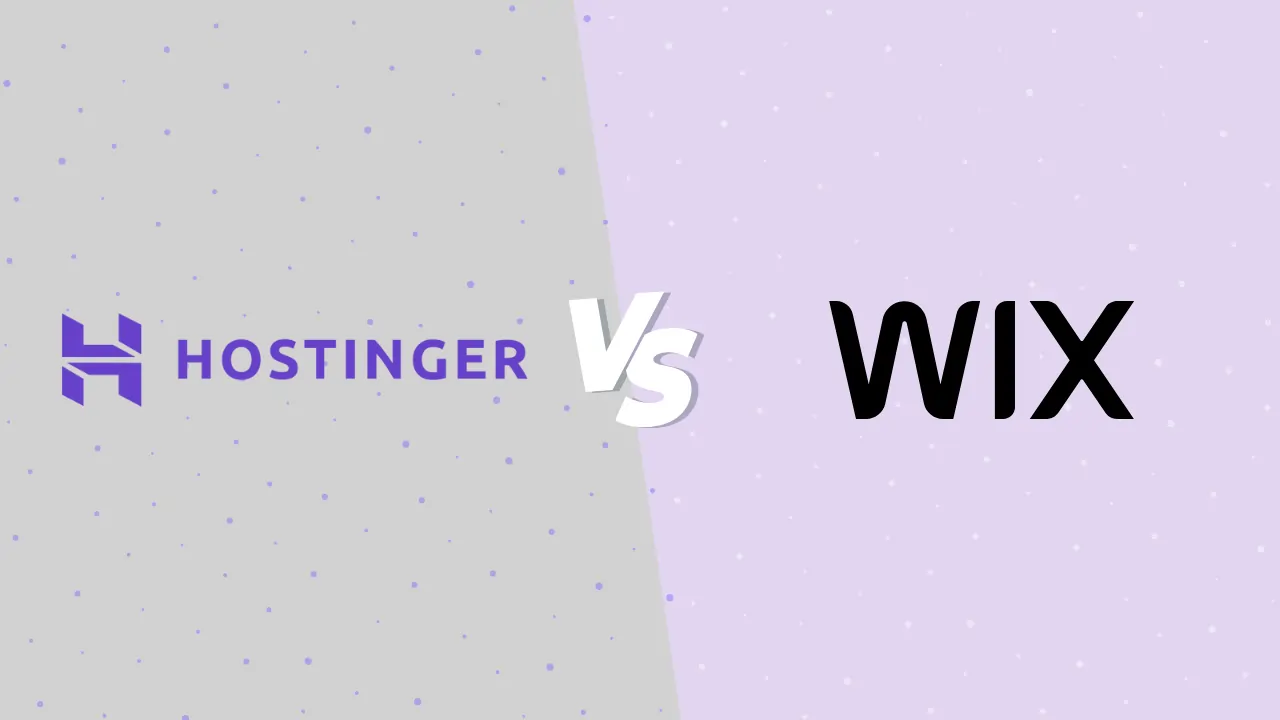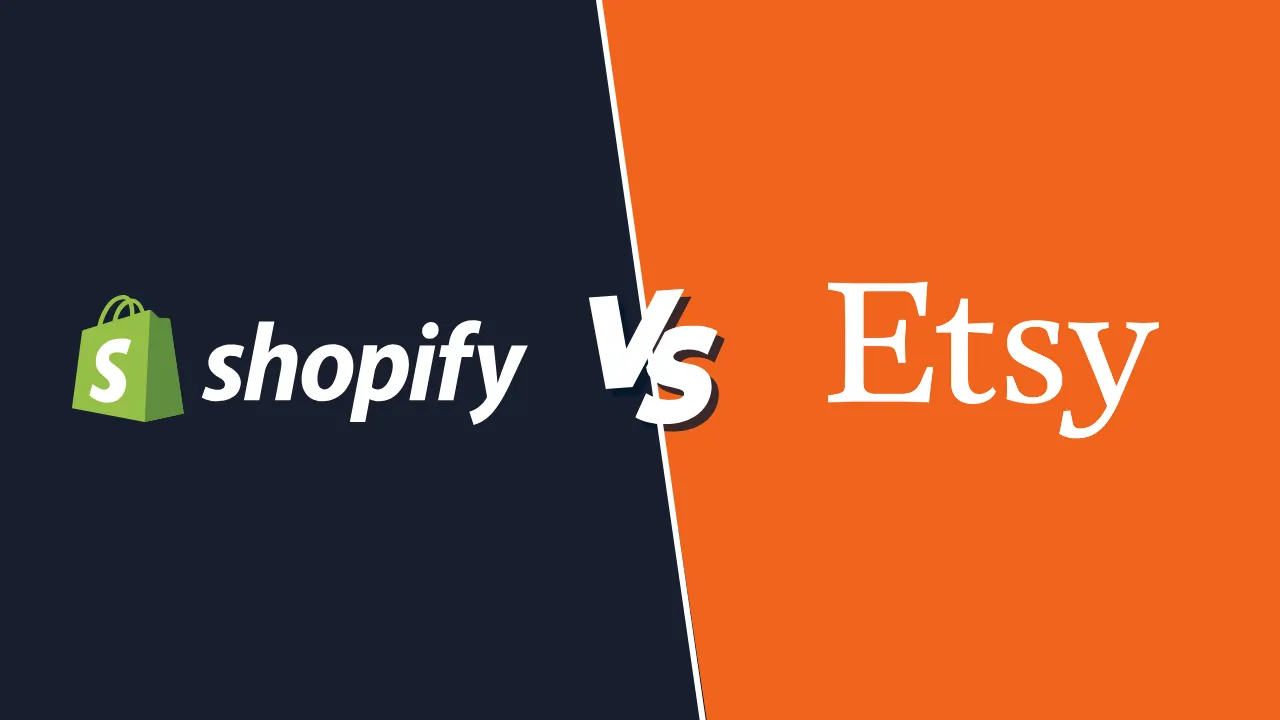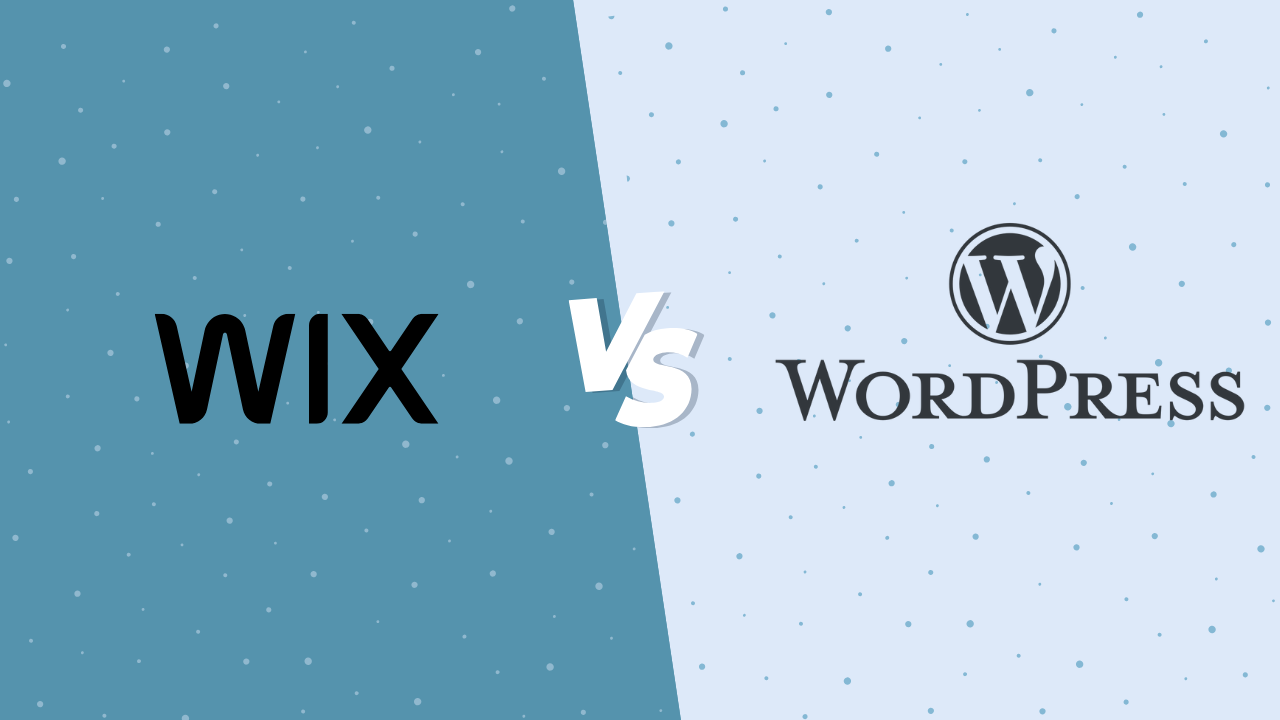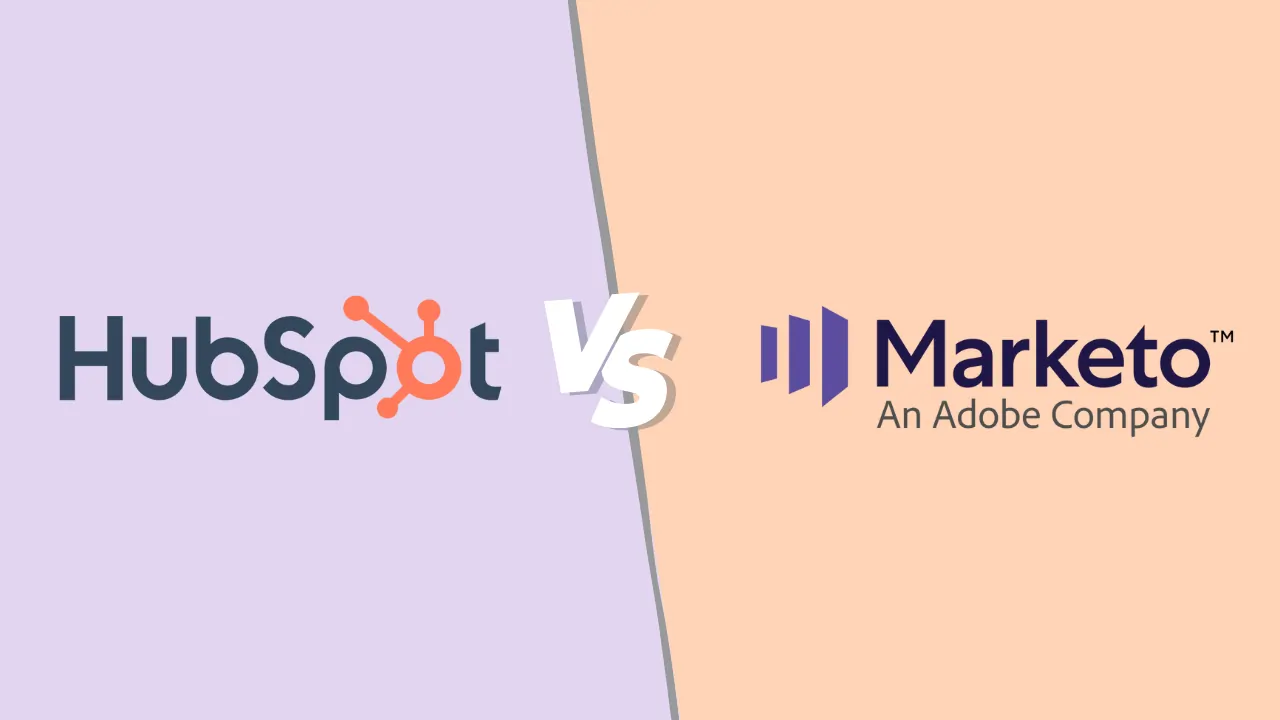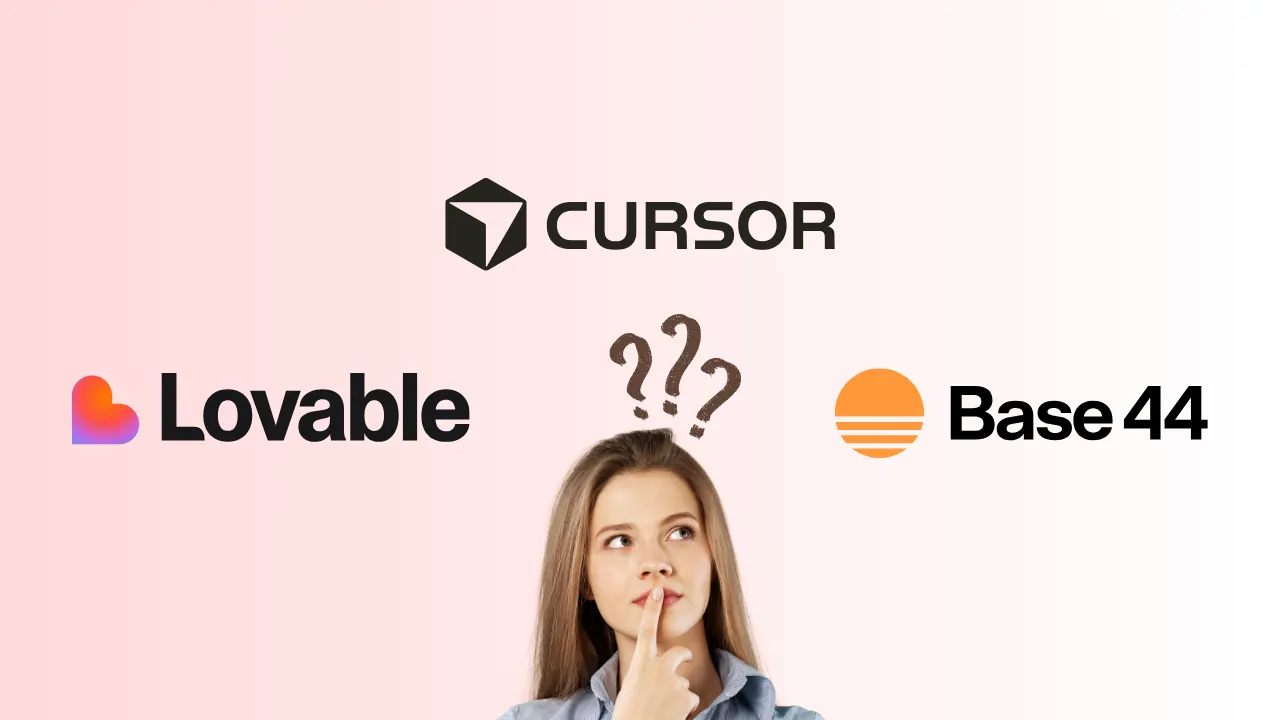Wix vs. Shopify: Which One Is Better for Your E-commerce Business?
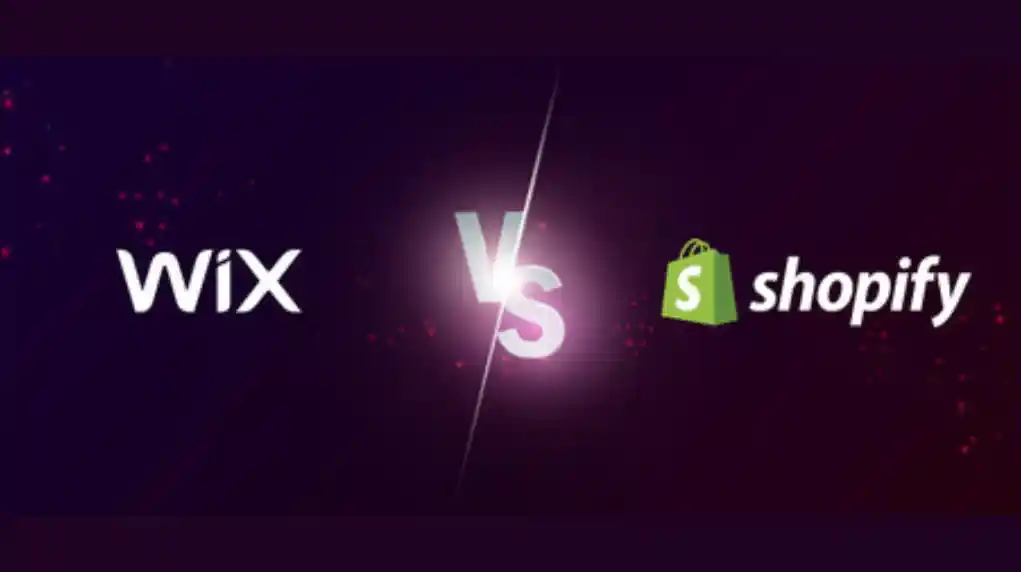
Wix and Shopify are two of the most popular options, each offering a unique approach to building and managing your online business. Wix is a versatile website builder known for its user-friendly drag-and-drop interface and a wide selection of customizable templates, making it easy for anyone to create a professional-looking online store without coding. It’s ideal for those who want to combine content, services, and e-commerce in one place. On the other hand, Shopify stands out as a dedicated e-commerce platform, purpose-built for selling products online at scale. Shopify offers advanced features such as robust inventory management, multi-channel selling, and a vast app ecosystem, making it a top choice for businesses focused on growth and scalability. As we compare Wix and Shopify, we’ll explore how each platform’s strengths can help you achieve your e-commerce goals, whether you’re just starting out or ready to expand your online presence.
Choosing the right platform to build your online store is a critical decision. When comparing Wix vs Shopify, it all comes down to your business needs, technical skills, and growth goals. In this article, we’ll break down the difference between Wix and Shopify, covering everything from features to pricing to FAQs.
TL;DR (quick pick)
- Pick Wix if you’re an SMB that wants the fastest “all-in-one” website + light-to-mid eCommerce + bookings, with built-in AI site creation/marketing tools, a user friendly interface ideal for beginners, and native POS available in supported regions. Wix’s free plan is a great advantage if you want to try before committing. Great if content + services + some selling is your model.
- Pick Shopify if you’re product-led and plan to scale online and in-person retail, need deeper commerce, POS across many countries, and AI for store setup and operations. It’s purpose-built for commerce and has a massive app ecosystem.
Wix vs Shopify: Quick Overview
Wix and Shopify allow you to build an online store, but they cater to different audiences and business models.
- Wix: Originally built as a website builder, Wix later added e-commerce functionalities. It excels in creative flexibility, simplicity, and lower upfront costs. It’s best suited for small businesses, service providers, and those launching an online store as part of a broader website.
Wix eCommerceAll-in-one eCommerce platformStarting from:$29 /moDropshipping-friendly
Social Media & Amazon selling integration
- Shopify: Explicitly built for e-commerce from day one, Shopify offers a powerful, scalable platform that can handle small shops to massive multi-national brands. It provides more in-depth tools for inventory management, payment processing, marketing automation, and scalability.
ShopifyTry for free, then get 3 months for $1/monthStarting from:$5 /moTrusted by millions of businesses globally
Drag-and-drop store creator
When comparing “is Shopify or Wix better” for e-commerce, it depends on your long-term plans. If you want to test a small store or need a beautiful website with an attached shop, Wix might be perfect. If you’re serious about online selling and anticipate scaling quickly, Shopify is built for that.
At a glance:
- Wix: Great for beginners, creatives, freelancers, and small businesses.
- Shopify: Great for ambitious sellers, growing brands, and businesses with e-commerce as their primary revenue channel.

Core
Pros
- You can integrate directly with social platforms
- Built-in email marketing and cart abandonment workflows
- Dozens of payment processors options
Cons
- Templates aren’t interchangeable
- Some elements can’t be fully customized

Starter
Pros
- Large suite of marketing tools to grow your website
- You’re able to sell online, offline, and through multiple marketplaces
- It has a built-in payment processor
Cons
- It charges you for third party payment processors
- The basic plan doesn’t have access to pro reports
Quick Comparison: Wix or Shopify
| Feature | Wix | Shopify |
| Ease of Use | Very easy, drag-and-drop | Easy, structured |
| E-commerce Features | Basic tools, limited channels | Full tools, multi-channel |
| Customization | Flexible, no coding | Deep via apps/coding |
| SEO | Good basics | Strong, advanced |
| Payment Options | Fewer gateways, higher fees | 100+ gateways, lower fees |
| Pricing | Starting from $17/month | Starting from $5/month |
| Free Plan / Free Trial |
✅ Yes | ✅ 3-day free trial |
| Scalability | Small to medium stores | Small to enterprise |
| Integrations | Limited apps | Thousands of apps |
| POS System | Basic POS | Full POS system |
| AI Features | Basic AI (design) | Advanced AI (sales, marketing) |
| Inventory Management | Basic tracking | Advanced, real-time |
| Best For | New/small sellers | Growth-focused sellers |
Snapshot table: main features (SMBs)
| Area | Wix | Shopify |
|
Site/Store creation |
AI Website Builder creates a tailored site from a chat; ongoing AI tools for copy & design. Advanced users can leverage Wix Studio for complex, responsive designs and multi-site management. |
AI Store Builder generates complete store layouts from keywords; part of broader Shopify Magic/Sidekick. |
|
AI assistants |
Astro (business assistant) in dashboard; AI Marketing Agent (“Kleo”); AI Site Chat for customers; AI Visibility Overview for LLMs/AI search. |
Shopify Magic (content like product descriptions, emails) and Sidekick (admin assistant); expanding AI suite. |
|
Catalog limits |
Up to 50,000 products in Wix Stores. |
No fixed product count cap published; variants per product historically 100; new product APIs support up to 2,000 variants (rolling out). |
|
POS |
Wix POS (Register & Mobile) unifies online/in-person; available in select regions. |
Shopify POS available broadly; unified inventory, omnichannel workflows. |
|
Apps & integrations |
App Market (hundreds of apps) + native business tools. |
Shopify App Store: 8,000+ apps (official). |
|
Analytics |
Wix Analytics dashboards, real-time stats, alerts, and Analytics AI prompts. |
Shopify Analytics with new reports, ShopifyQL, cohorts, Live View. |
|
Security & compliance |
SOC 2 Type II, PCI DSS Level 1, ISO certifications; status page & uptime tools. |
PCI DSS Level 1 platform, status page, recent 99.9% uptime over trailing 90 days. |
|
Performance/hosting |
Global multi-cloud infra; Wix publishes uptime stats and reliability pages. Shopify website performance is known for fast load times and robust backend management. |
Global CDN, commerce-grade hosting baked in. |
|
Pricing (high-level) |
Website + Business/eCommerce plans (regional pricing). The core plan is the starting point for ecommerce capabilities. |
Free trial; tiered Basic/Shopify/Advanced plans; POS options. |
What this means for SMBs (common scenarios)
- Service business + content hub + some merchandise → Wix. Wix can handle ecommerce for small to mid-sized ecommerce businesses, making it a good fit for those seeking ease of use and visual appeal. Faster “single-pane” setup with bookings/events/blog, AI marketing agent, and on-site AI chat for support/sales.
- Retail/eCommerce first (online + physical store), SKU growth, multi-channel → Shopify. Strong POS footprint, mature ecosystem, and AI that shortens setup and assists daily operations.
- Large variant matrices now have a clearer path on Shopify (2,000-variant product model via new APIs)—but verify availability in your store; it’s rolling out.
Wix E-commerce vs Shopify: Key Differences
1. Ease of Use
- Wix: Wix is incredibly user-friendly, using a true drag-and-drop editor that lets you place elements anywhere without restrictions. Unlike Shopify, Wix offers greater design flexibility with its drag-and-drop editor, giving users more creative freedom and customizable options without the need for coding. Building a storefront feels like designing a simple website — fast, visual, and intuitive. You can edit layouts, images, and products without dealing with technical settings. However, when scaling to hundreds of products or integrating complex logistics, Wix can start to feel clunky.
- Shopify: Shopify is user-friendly but operates within a structured framework designed for serious selling. Unlike Wix, Shopify’s editor is more structured and less flexible, focusing on a section-based editing system. The platform walks you through store setup logically: adding products, setting up shipping, configuring taxes, and optimizing payments. You won’t get as much design freedom without editing code, but everything is geared toward creating a high-converting shopping experience. Mastering Shopify’s deeper tools takes more time but offers massive long-term benefits for business growth.
Which is best for what
- Wix: Best for creators, small businesses, and service providers who want full visual control and a quick launch without worrying about e-commerce complexities.
- Shopify: Best for entrepreneurs who prioritize professional e-commerce operations, structured workflows, and have plans to scale into serious online selling across multiple channels.
2. E-commerce depth & POS
-
Wix: Handles simple selling needs — product pages, coupon codes, and basic inventory tracking.
-
Shopify: Advanced features including multiple sales channels (social media, marketplaces), inventory sync, subscription sales, and abandoned cart recovery.
Which is best for what
-
Wix: Best for smaller catalogs and basic online stores.
-
Shopify: Best for larger catalogs and businesses that want to sell across multiple platforms.
3. Design and Customization
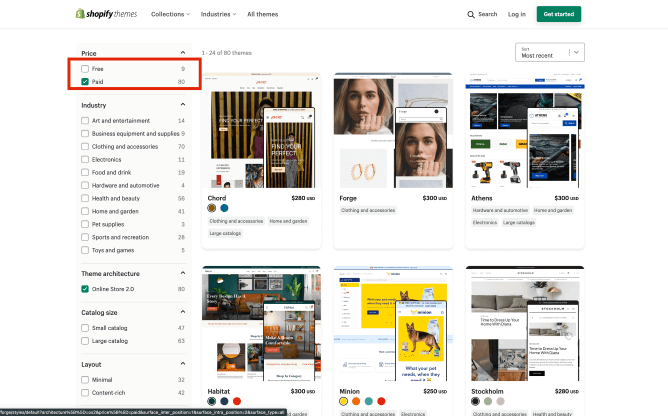
-
Wix: Over 900 free, responsive Wix templates are available for various website needs, especially eCommerce stores. Wix’s templates offer a large variety of modern, stylish designs, though customization can be limited unless you use advanced tools like Wix Studio or Wix Velo. Wix Studio is ideal for agencies and professionals who need advanced design capabilities and multi-site management.
-
Shopify: Shopify’s themes are professionally designed, industry-specific, and optimized for sales conversion, though there are fewer free options and premium themes can be costly. Custom development is also available for further flexibility.
Who is best for what:
-
Wix: Best for those prioritizing creative freedom and unique design.
-
Shopify: Best for businesses focused on a streamlined, mobile-optimized shopping experience.
4. Payment Options
-
Wix: Supports major credit cards, PayPal, and Stripe. Limited integration with some payment providers.
-
Shopify: Offers Shopify Payments and over 100 payment gateways, including regional options.
Which is best for what
-
Wix: Best for businesses targeting local audiences with standard payment needs.
-
Shopify: Best for businesses with international customers or complex payment requirements.
5. Marketing Tools
-
Wix: Includes basic email marketing, simple social media ads, some SEO guidance, and integrated AI tools for generating Google Ads content to improve advertising performance.
-
Shopify: Robust marketing tools — advanced email automation, integrated social selling, SEO apps, built-in and supplementary SEO features that enhance website visibility, and access to Shopify’s ad retargeting networks.
Which is best for what
-
Wix: Best for simple marketing efforts with a tight budget.
-
Shopify: Best for businesses planning aggressive marketing and expansion.
Using Google Ads to Promote Your Store
Promoting your online store is crucial for attracting new customers and driving sales, and Google Ads is one of the most effective ways to boost your visibility. Both Wix and Shopify make it easy to connect your store with Google Ads, streamlining the process of creating and managing ad campaigns.
Wix offers a built-in Google Ads manager, allowing you to launch targeted campaigns directly from your website builder dashboard. Shopify, meanwhile, provides a dedicated Google Ads app available in the Shopify App Store, giving you access to advanced marketing tools and seamless integration with your online store.
By leveraging Google Ads, you can reach potential customers across search engines and the web, increase traffic to your site, and grow your sales. Shopify’s ecommerce features, such as multi-channel selling and advanced inventory management, make it especially powerful for businesses looking to scale their marketing efforts. Whether you use Wix or Shopify, integrating Google Ads into your marketing strategy can help you maximize your store’s reach and performance.
6. SEO
This section covers SEO features for optimizing your website’s search engine visibility.
-
Wix: Provides customizable URLs, meta tags, alt text for images, and basic SEO settings. Wix also offers a built-in SEO checklist to guide users through optimization tasks, and users have direct control over canonical tags to avoid duplicate content issues.
-
Shopify: Built-in SEO best practices, automatic sitemaps, mobile-optimized themes, and access to advanced SEO apps. Shopify allows integration with Google Analytics to track SEO performance and visitor behavior.
Which is best for what
-
Wix: Best for businesses needing basic SEO improvements.
-
Shopify: Best for companies wanting a serious, structured SEO strategy.
7. Store Templates
-
Wix: Huge variety of free, visually stunning templates, designed to suit various Wix website needs, including eCommerce. The wide selection is especially beneficial for setting up a Wix store.
-
Shopify: Professional, high-converting templates, especially optimized for mobile shopping.
Which is best for what
-
Wix: Best for businesses that want their brand to visually stand out.
-
Shopify: Best for businesses that prioritize performance and conversions.
8. Support
-
Wix: 24/7 phone and ticket support with a robust knowledge base.
-
Shopify: Shopify support is a comprehensive 24/7 service available via live chat, email, and phone, offering quick response times, helpful tutorials, active community forums, and a specialized ecommerce support team. Plus, there is an extensive partner ecosystem.
Which is best for what
-
Wix: Best for users needing quick basic help.
-
Shopify: Best for businesses that may need expert assistance for scaling.
9. Security, compliance & reliability
- Wix: SOC 2 Type II, PCI DSS Level 1, ISO certifications, multi-cloud hosting (AWS/GCP/Equinix), live status & uptime view. All Wix websites include SSL encryption to ensure secure data transmission, which helps build customer trust and supports compliance requirements. Wix cites 99.98% uptime historically and advertises 99.9%+ in hosting materials; check the status page for real-time view.
- Shopify: platform-level PCI DSS Level 1 compliance; official help notes 99.9% uptime across major services over the past 90 days; live status page available.
10. Performance & Core Web Vitals
Both run on global CDNs with managed hosting. Some users consider Shopify as one of the best Wix alternatives due to its superior speed and mobile responsiveness. Wix documents site reliability tooling (including a dashboard to see your last 90 days of uptime and global availability); Shopify provides the same visibility through its status infrastructure. As always, theme/app choices and media practices affect real-world speed, but Wix alternatives like Shopify may offer advantages in loading speed and overall efficiency.
11. Ecosystem & integrations
- Shopify App Store lists 8,000+ apps—from shipping/3PL to subscriptions, B2B, loyalty, and retail tooling. Shopify’s extensive app store is a key advantage, providing a wide selection of third-party apps to expand store functionality, customization, and integration options. This depth is a major scaling lever for SMBs as needs grow.
- Wix App Market offers curated integrations and many native modules (Bookings, Events, Restaurants, Programs), reducing app sprawl for content-led SMBs.
12. Analytics & business insights
- Shopify: modernized Analytics with new default reports, ShopifyQL explorations, and customer cohort/RFM reporting. You can also integrate Google Analytics to gain deeper insights into visitor behavior and ecommerce conversions.
- Wix: Wix Analytics includes real-time dashboards, customizable reports, and smart alerts; an Analytics “Highlights” view supports guided, AI-prompted questions.
How Much Does Wix Cost?
-
Core: $29/month — Basic online store features.
-
Business: $26/month — Additional storage, subscriptions.
-
Business Elite: $159/month — Priority support and advanced features.
Wix’s free plan allows users to try the platform at no cost, but it includes a Wix domain rather than a custom one. For those who upgrade, most paid plans offer a free domain for the first year, adding value for new users looking to establish their online presence.
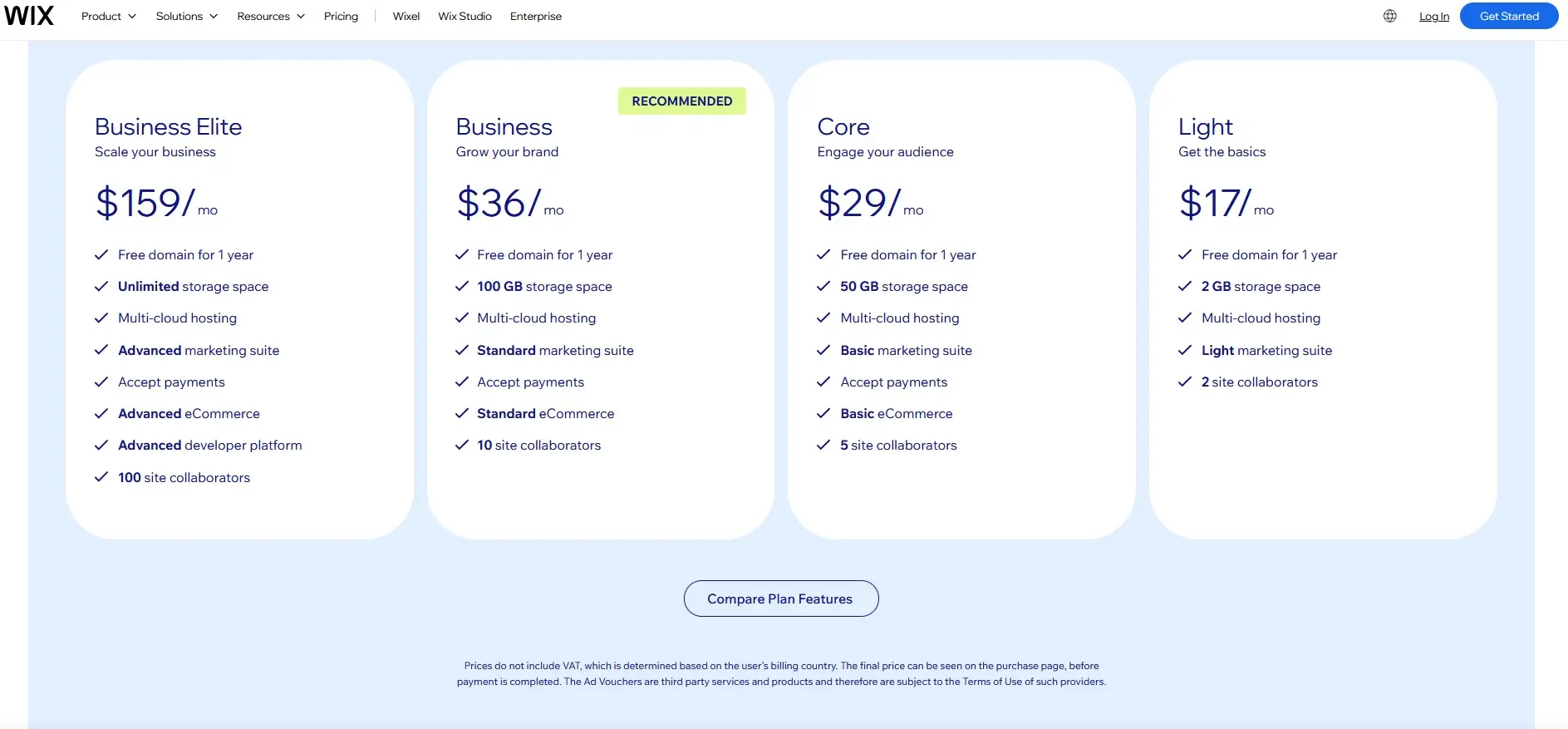
Who is best for what:
-
Budget-conscious small businesses that need a functional store without advanced sales tools.
How Much Does Shopify Cost?
- Starter: $5/month – Sell instantly through social media
-
Basic Shopify: $29/month — Core e-commerce features.
-
Grow: $79/month — Professional reports, better shipping rates.
-
Advanced Shopify: $299/month — Advanced reporting, third-party calculated shipping.
Upgrading your Shopify plan can reduce transaction fees and unlock additional features, such as calculated shipping rates and advanced reporting.
Shopify often offers promotional $1/month deals for the first three months.
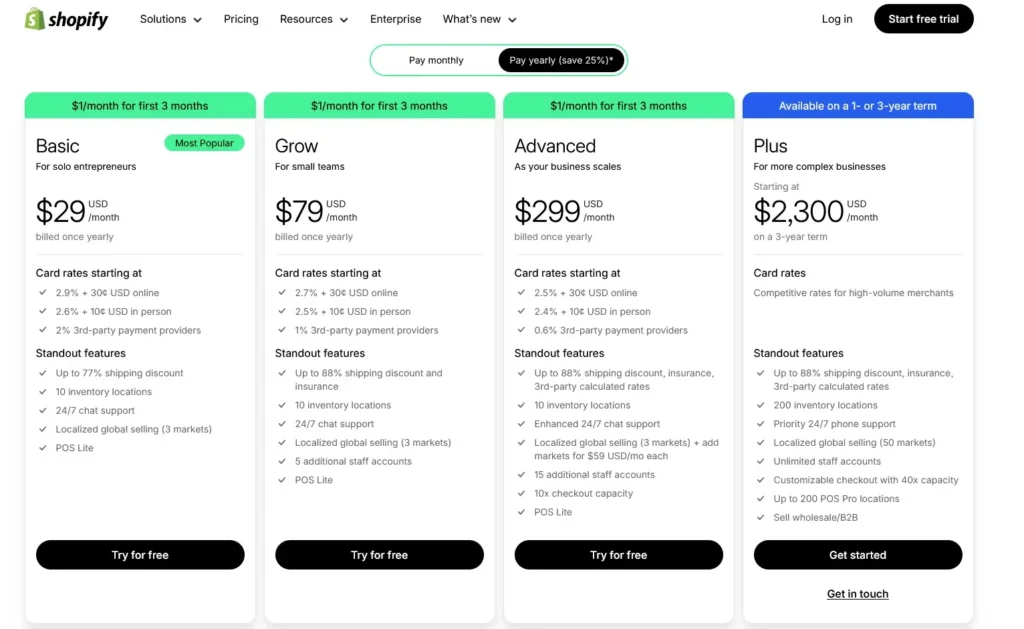
Shopify plans and pricing
Which is best for what
-
-
Growing businesses ready to invest more in powerful tools and scalability.
-
Is it possible to switch between Wix and Shopify?
Switching platforms is definitely possible, but it comes with challenges. Migrating to a Shopify website may require careful planning and the use of migration tools. Both platforms offer detailed documentation to assist with the migration process.
Switching from Wix to Shopify:
- Create a Shopify Account: Choose the right plan for your business size.
- Migrate Your Store Data: Use migration tools like Cart2Cart, or manually export/import your products, customers, and orders.
- Redesign Your Store: Shopify themes are structured differently than Wix, so expect to rebuild or rebrand your storefront.
- Configure Core Settings: Set up your payment gateways, shipping rates, taxes, and legal pages.
- Set Up Redirects: Preserve SEO rankings by redirecting old Wix URLs to your new Shopify pages.
- Test Before Launch: Check all links, checkout flows, payment processing, and mobile optimization.
- Launch Your Shopify Store: Once you’re sure everything works, go live!
Switching from Shopify to Wix:
- Less common because Wix is generally seen as a step down in e-commerce capabilities.
- If you still decide to move, you’ll need to recreate products, pages, and settings manually.
- Be aware that some features, such as Shopify’s abandoned cart recovery, multi-channel integrations, and advanced SEO options, may not transfer easily.
- You’ll likely need to rebuild and rethink your store’s structure to fit Wix’s simpler framework.
Summary:
- Switching from Wix to Shopify is popular for businesses that outgrow Wix and need a more powerful platform.
- Switching from Shopify to Wix is rare and usually only for businesses scaling down, prioritizing content over e-commerce, or seeking lower costs.
Quick Summary: Key Takeaways Between Wix and Shopify
- Wix is easier and faster for beginners with its drag-and-drop builder, while Shopify offers a structured setup better suited for serious e-commerce stores. Wix excels in user-friendly website building and design flexibility, making it ideal for creatives and small businesses seeking simplicity and versatility.
- Shopify outperforms Wix in terms of e-commerce features with advanced selling options, subscription models, and multiple sales channels.
- Wix gives full creative control without coding, ideal for visually-driven businesses. Shopify requires some coding for deep customization but offers superior performance.
- SEO: Shopify wins for serious SEO strategies, including rich snippets and faster page speeds. Wix is fine for basic SEO needs.
- Payment Options: Shopify provides broader payment gateway support and reduced fees with Shopify Payments compared to Wix.
- Pricing: Wix is more budget-friendly for smaller projects; Shopify offers better long-term value for scalable businesses.
- Scalability: Shopify is the clear choice for businesses with growth ambitions, supporting enterprise-level operations.
- Integrations: Shopify has a much wider ecosystem of apps and integrations for marketing, inventory, and sales expansion.
- POS Systems: Shopify’s POS is full-featured for omnichannel selling, while Wix POS remains basic and region-limited.
- AI Features: Wix offers simpler AI tools (like automatic design via Wix ADI), while Shopify integrates smarter AI features for recommendations, inventory management, and marketing.
- Inventory Management: Shopify supports large, complex inventories with multi-location stock management; Wix is better suited for small stores with limited stock.
Bottom Line:
- Choose Wix if you want an easy, affordable website with light online selling capabilities.
- Choose Shopify if you’re serious about growing a professional, scalable e-commerce business across multiple channels.
Related Articles
Shopify vs. Wix: Which Should You Choose?
- Choose Wix if:
-
🛠️ You want an easy drag-and-drop design with no technical skills needed.
-
🛒 You need a small online store connected to a blog, portfolio, or service website.
-
💸 You’re looking for lower starting costs and a free plan to experiment.
-
🎨 You prioritize creative freedom and design customization over advanced e-commerce features.
- 👥 Wix users benefit from features tailored to their needs, such as POS and checkout customization.
-
Wix is best for: Beginners, service providers, small stores, or anyone adding a simple shop to a content site.
- Choose Shopify if:
-
🏪 You’re building a serious e-commerce business with growth in mind.
-
🌍 You want multi-channel sales (sell on Amazon, Instagram, Facebook, etc.).
-
📦 You need strong inventory management, shipping options, and advanced analytics.
-
💡 You’re willing to invest a little more upfront for scalability and future-proofing.
-
Shopify is best for: Dedicated online stores, growing brands, or anyone serious about selling products at scale.
Conclusion: Selecting the Best Option for Your Online Store
Choosing the right ecommerce platform is a pivotal decision for your online store’s success. Both Wix and Shopify offer compelling solutions, but the best choice depends on your business’s unique needs and growth plans. Wix is perfect for small to medium-sized businesses seeking an intuitive interface, built-in SEO tools, and a wide variety of templates to create a visually appealing store quickly. Its AI meta tag creator and user-friendly design tools make it easy to optimize your site for search engines and stand out online. Shopify, on the other hand, is designed for businesses ready to scale, offering advanced features like multi-channel selling, advanced inventory management, and access to the extensive Shopify App Store. With Shopify, you can take advantage of powerful ecommerce functionality, robust analytics, and seamless integrations to support your growth.
To get the most out of your chosen platform, consider using Google Ads to drive targeted traffic and boost your online visibility. Both Wix and Shopify offer integrations that make it easy to launch and manage ad campaigns. Additionally, explore the app markets on both platforms to enhance your store’s capabilities, from marketing tools to inventory management solutions. By aligning your platform choice with your business goals and leveraging the advanced features each offers, you’ll be well-positioned to build a successful and scalable online store.
FAQs
What is the Difference Between Wix and Shopify?
On the surface, both Wix and Shopify are designed to help small business owners create and manage an online store without breaking the bank. Going a tad deeper into the technicalities, you might find that Shopify caters mainly to product businesses while Wix offers options that are suitable for both product sellers and service renderers.
Should I Switch from Wix to Shopify?
Whether you should switch from Wix to Shopify depends on your business needs and, of course, budget. Shopify may offer a much more sophisticated App Store for product sellers that want to scale fast but they are quite expensive.
So, if Wix still serves you well enough, I don’t see any reason why you should consider changing. But if scaling is the goal, you can give Shopify a try. In my opinion, however, service renderers are better served on Wix.
Which is Cheaper? Wix or Shopify?
Beyond reasonable doubts, Wix is significantly cheaper than Shopify. The most expensive Wix package goes for $35 per month on the Business VIP while Shopify high-end users part with $299 every month on the Advanced Plan.
The enterprise options also reflect similar price disparity. Wix starts its enterprise pricing at $500 per month while Shopify Plus draws a whopping $2,000 from your corporate wallet every month.
Which is Better for Dropshipping? Wix or Shopify?
Both Shopify and Wix provide dropshipping solutions. However, Shopify has a broader range of options for sellers to choose from.
Which is Better for e-commerce? Wix or Shopify?
E-commerce is basically trading over the internet and both Wix and Shopify provide solutions for businesses to effectively sell and buy electronically. However, Shopify is designed solely for that purpose. While Wix offers a little more than just e-commerce tools, its solutions are not mediocre in any way.
Is Shopify Easier to Use than Wix?
Hard to tell whether either of these solutions is easier to use. Shopify provides a lot more app integrations for its users than Wix but the design interface on Wix is more intuitive and user-friendly.

